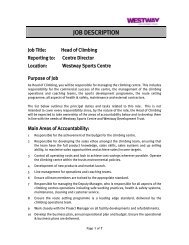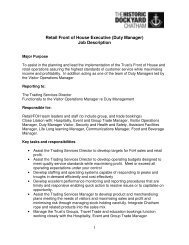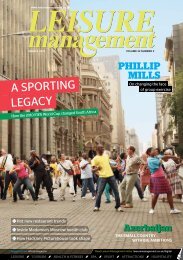Leisure Media Issue 3 2009 - Leisure Opportunities
Leisure Media Issue 3 2009 - Leisure Opportunities
Leisure Media Issue 3 2009 - Leisure Opportunities
- No tags were found...
Create successful ePaper yourself
Turn your PDF publications into a flip-book with our unique Google optimized e-Paper software.
BISLThis year’s budget offered a few positiveannouncements, but also measures thatcan sting businesses, not to mentionlittle help for sport, leisure, hospitalityand tourism, says Brigid SimmondsWith public borrowing at £175bn, 12 per cent of GDP,and public sector net debt forecast to rise to 79 percent of GDP over the next five years, there wouldseem little left to help the sport, leisure, hospitalityand tourism business based on April’s budget. But it’s worthlooking at what help is available and how the industry’s doing.To many raised eyebrows, the chancellor forecast GDPgrowth of 1.25 per cent for 2010, and 3.5 per cent from 2011.This led him to promise to protect investment in key public services,notably education and health. But he also promised furtherefficiencies across Whitehall. As a result, DCMS will contribute£20m in savings as part of an additional £5bn in 2010-2011.Watch this space for cuts from DCMS – how will sport beaffected? (Not from front line services yet, it’s understood.) Callsfor more funding for tourism are likely to fall on deaf ears.For all businesses paying business rates, the chancellorannounced the optionof spreading payments for this year’s businessrates over three years. There is, however, a real sting in thetail for all ratepayers – the new rating revaluation kicks in from2010, based on trading as at 1 April 2008, when economic conditionswere much more favourable than they are now. GeraldEve has looked at the effect on a whole series of leisure sectorsincluding pubs, hotels, restaurants, nightclubs and cinema. Inalmost all of these sectors, trading conditions were much betterin 2008, and therefore the 2010 revaluation will be higher.PHOTO: WWW.ISTOCKPHOTO.COM/LISA KYLE YOUNGA LOOK AT THE BUDGETThe chancellor’s offer to defer this year’s rates into later yearscould see businesses running into real trouble come 2010,when they have to pay higher rates under the next revaluationand back payments for this year. In addition, supplementarybusiness rates for all businesses will be introduced next yearby individual local authorities, which have the ability to add 2pin the pound. Local authorities and businesses outside Londonneed to discuss what the additional rates will pay for, but insidethe M25 most of these rates are earmarked for the Crossrailproject, so there’s no chance that they’ll be deferred.The chancellor also announced that CIL – the CommunityInfrastructure Levy – will be deferred until April 2010. (We’re stillawaiting the final details on how the scheme will work). But thisagain allows local authorities to tax new and existing developmentsrequiring planning permission. The tax is discretionaryfrom local authorities, but there’s no doubt that many will introduceit. Many businesses had asked the government to makechanges to Empty Property Rate Relief – which is leading toempty buildings being pulled down as the only alternative topaying this tax – but no changes were made in the budget. Sofor those who own property, the outlook is rather depressing.POSITIVE ANNOUNCEMENTSOn a more positive level, the chancellor announced that thegovernment will extend the enhanced ‘loss relief’, which allowscompanies to offset profits in previousyears against any current losses,for another year. The chancellor alsoannounced a government top-up of tradecredit insurance. This will help companiesfinding it difficult to persuade othercompanies to give them credit while theywait to be paid, by providing additionalgovernment-backed insurance againstthis risk. In the past few months, companieswho specialise in credit insurance ofthis type have been withdrawing it fromsome businesses in the leisure sector ona rather ad hoc basis; this relief is particularlywelcome.There will also be an increase in capitalallowances for new investment to 40 percent for one year, until 6 April 2010. Whilethis relief is useful for capital projectscurrently underway, it’s unlikely manyThe chancellor removed doubletaxation on bingo participationfees, but raised bingo duty46 Read <strong>Leisure</strong> Management online leisuremanagement.co.uk/digitalISSUE 3 <strong>2009</strong> © cybertrek <strong>2009</strong>
















